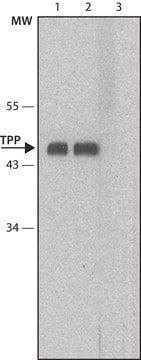MAB1611
Anti-Keratin Epithelial Antibody, clone AE3
clone AE3, Chemicon®, from mouse
Synonyme(s) :
Type II Cytokeratin
About This Item
Produits recommandés
Source biologique
mouse
Niveau de qualité
Forme d'anticorps
purified antibody
Clone
AE3, monoclonal
Espèces réactives
rat, chicken, rabbit, mouse, human, monkey, bovine
Fabricant/nom de marque
Chemicon®
Technique(s)
immunohistochemistry: suitable (paraffin)
western blot: suitable
Isotype
IgG1
Numéro d'accès NCBI
Numéro d'accès UniProt
Conditions d'expédition
wet ice
Modification post-traductionnelle de la cible
unmodified
Spécificité
Immunogène
Application
Western blotting: Clone AE3 recognizes the 65 to 67, 64, 59, 58, 56 and 52 kDa human cytokeratins of the basic subfamily.
Optimal working dilutions must be determined by end user.
Cell Structure
Cytokeratins
Liaison
Forme physique
Stockage et stabilité
Remarque sur l'analyse
POSITIVE CONTROL: MCF-7, RT112, and A431 cell lines.
Autres remarques
Informations légales
Clause de non-responsabilité
En option
Mention d'avertissement
Danger
Mentions de danger
Conseils de prudence
Classification des risques
Repr. 1B
Code de la classe de stockage
6.1D - Non-combustible acute toxic Cat.3 / toxic hazardous materials or hazardous materials causing chronic effects
Classe de danger pour l'eau (WGK)
WGK 1
Point d'éclair (°F)
Not applicable
Point d'éclair (°C)
Not applicable
Certificats d'analyse (COA)
Recherchez un Certificats d'analyse (COA) en saisissant le numéro de lot du produit. Les numéros de lot figurent sur l'étiquette du produit après les mots "Lot" ou "Batch".
Déjà en possession de ce produit ?
Retrouvez la documentation relative aux produits que vous avez récemment achetés dans la Bibliothèque de documents.
Notre équipe de scientifiques dispose d'une expérience dans tous les secteurs de la recherche, notamment en sciences de la vie, science des matériaux, synthèse chimique, chromatographie, analyse et dans de nombreux autres domaines..
Contacter notre Service technique







